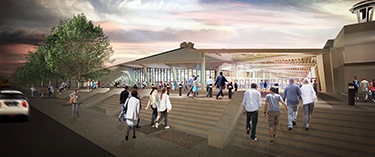|
Subscribe / Renew |
|
|
Contact Us |
|
| ► Subscribe to our Free Weekly Newsletter | |
| home | Welcome, sign in or click here to subscribe. | login |
Real Estate
| |
September 14, 2017
City seeks OK for $600M deal to redo KeyArena
The city of Seattle has reached a formal agreement with Los Angeles-based Oak View Group to renovate KeyArena, and sent a memorandum of understanding to the City Council for approval.
The $600 million project would double the size of KeyArena, creating a venue of up to 19,000 seats for concerts, and NHL and NBA teams. The arena would keep its historic roofline and meet LEED gold standards.
Seattle Mayor Ed Murray had been scheduled to deliver an announcement about the agreement on Tuesday, but canceled after The Seattle Times reported a new sexual-abuse accusation against him, prompting his resignation.
Murray's sudden exit could add uncertainty to the city's decision-making process. For now, the goal is for the City Council to vote on the MOU by Dec. 4 so the project can stay on track to open in October 2020.
A group led by investor Chris Hansen has a separate MOU with the city and King County that expires on Dec. 3 to develop an arena in SoDo.
In a statement, Oak View Group CEO Tim Leiweke said that with the KeyArena renovation, “Seattle is now in the best position possible to bring back the NHL and NBA, while also creating a world-class live music venue worthy of its historic and iconic location.”
The agreement outlines a number of components in the plan, including financing, risk mitigation, transportation, Seattle Center impacts and community benefits.
Under the agreement, Oak View Group would sign a 39-year lease with two eight-year renewal options. Construction would begin in October 2018.
The project team includes Populous and Icon Venue Group.
The arena would be funded by OVG with a combination of private equity, debt financing from lenders and federal historic tax credits.
OVG would be responsible for operating and maintaining the arena. Its eight-year lease extensions would vest only if the group invests at least another $168 million for capital improvements, and keeps the building on par with similar arenas throughout the term of its lease.
OVG would also be responsible for cost overruns during construction and assume the risk of increased costs due to unknown environmental conditions.
The city would continue to draw income from the arena, including about $2.4 million a year in tax revenues. OVG would be on the hook to make up the difference if revenues fall below that. The city also would get around $2.6 million a year from other operations. Additional city revenue would come from sources such as the Mercer and Fifth Avenue parking garages and campus sponsorships.
OVG will contribute $40 million for a transportation fund to lessen traffic impacts around the arena, a part of the city that has seen traffic worsen since the departure of the Sonics in 2008, thanks to the growth of Amazon and other big employers.
OVG and the city will develop a north downtown “mobility action plan,” for which OVG will contribute up to $250,000 for a transportation consultant.
A section of the agreement focuses on integrating the arena with Seattle Center. OVG will pay $1.5 million to relocate a maintenance facility and a skate park located south of KeyArena, and $500,000 to relocate other tenants.
OVG will separately pay to temporarily relocate another nonprofit tenant, Pottery Northwest, which has a space on First Avenue North.
The group will also assume the city's obligations to the Seattle Storm, or develop a new agreement with the WNBA team.
Community benefits will include a $20 million community fund, $10 million of which will go to YouthCare, which serves homeless youths. There will also be a community workforce agreement, labor agreements, an inclusion plan for WMBEs and a community benefits agreement.
OVG will also make a mandatory housing affordability payment for the increase in square footage.
If the City Council does not approve the MOU, the city estimates it would require at least $150 million to keep KeyArena operating.
According the Office of Economic Development, “If an investment is not made in the arena, the building will continue to fall into disrepair, becoming a blight on the Seattle Center and the neighborhood.”




